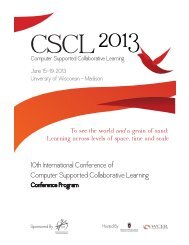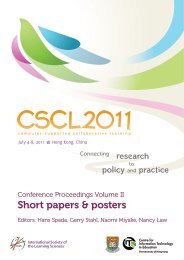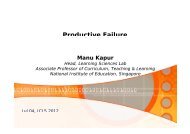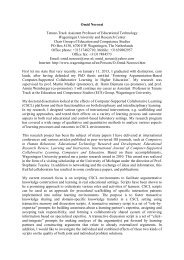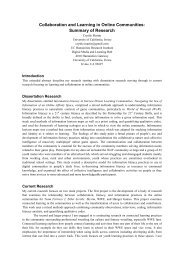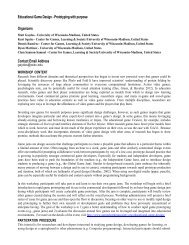icls pre-conference workshops - ISLS International Society of the ...
icls pre-conference workshops - ISLS International Society of the ...
icls pre-conference workshops - ISLS International Society of the ...
Create successful ePaper yourself
Turn your PDF publications into a flip-book with our unique Google optimized e-Paper software.
ICLS PRE‐CONFERENCE WORKSHOPS<br />
http://www.isls.org/<strong>icls</strong>2012/program/<br />
5. Classroom Orchestration: Moving Beyond Current Understanding <strong>of</strong> <strong>the</strong><br />
Field<br />
Workshop organizers<br />
a. Yannis Dimitriadis, University <strong>of</strong> Valladolid, Spain (contact person)<br />
b. Pierre Dillenbourg, EPFL, Lausanne, Switzerland<br />
c. Miguel Nussbaum, Pontificia Universidad Católica de Chile, Chile<br />
d. Chee‐Kit Looi, Nanyang Technological University, Singapore<br />
e. Jeremy Roschelle, Stanford Research Institute <strong>International</strong>, USA<br />
1. Rationale:<br />
Sustainability <strong>of</strong> innovative teaching and learning practices highly depends on effective scenarios in <strong>the</strong> complex<br />
classroom ecosystem, integrating multiple activities and tools at multiple social planes and contexts. Such<br />
multiplicity demands a holistic perspective implementing a flexible “orchestration layer” through ei<strong>the</strong>r<br />
technological or conceptual tools. One main question that arises is not only how do we change <strong>the</strong> curriculum and<br />
classical assessments to reach <strong>the</strong>se goals but also how do we organize <strong>the</strong> classroom, <strong>the</strong> available resources and<br />
<strong>the</strong> teachers role to achieve this transformation.<br />
Orchestration has emerged recently as a driving concept and metaphor. The complexity <strong>of</strong> <strong>the</strong> related issues has<br />
motivated a vivid debate in <strong>the</strong> community, which took <strong>the</strong> shape <strong>of</strong> multiple papers and reports that employ and<br />
explore <strong>the</strong> concept <strong>of</strong> orchestration, as well as a highly successful workshop at CSCL 2011.<br />
Some converging issues that emerged in this debate deal with <strong>the</strong> characteristics and graphical re<strong>pre</strong>sentations <strong>of</strong><br />
integrated pedagogical scenarios, as well as <strong>the</strong> need to empower teachers in <strong>the</strong> real‐time management <strong>of</strong> such<br />
scenarios, so that <strong>the</strong>y can flexibly enact designs and technologies (ei<strong>the</strong>r ICT‐based or not) in a minimalist way,<br />
taking into account <strong>the</strong> practicalities and time‐space constraints <strong>of</strong> classrooms. On <strong>the</strong> o<strong>the</strong>r hand, several issues<br />
are still subject <strong>of</strong> discussion, as e.g. <strong>the</strong> power and limitations <strong>of</strong> <strong>the</strong> underlying metaphor, <strong>the</strong> design <strong>of</strong><br />
adequate orchestration and orchestrable technologies, <strong>the</strong> right balance between planning and enactment,<br />
external and internal scripts, or <strong>the</strong> ways to advance towards a better usability at <strong>the</strong> classroom level.<br />
2. Content:<br />
The workshop builds on <strong>the</strong> considerable recent advances on classroom orchestration in <strong>the</strong> community and aims<br />
to deepen <strong>the</strong> discussion and analysis <strong>of</strong> <strong>the</strong> divergent and convergent aspects, expecting to shed light on <strong>the</strong><br />
concept, issues and eventual approaches towards effective integration <strong>of</strong> pedagogical scenarios in current and<br />
future classroom ecosystems. On <strong>the</strong> o<strong>the</strong>r hand, it aims to provide a common ground with o<strong>the</strong>r related fields,<br />
such as Learning Design, Pedagogical Patterns or Human Computer Interaction.<br />
The half‐day workshop, besides a short overview <strong>of</strong> <strong>the</strong> field, will be based on case studies submitted by <strong>the</strong><br />
participants. Senior researchers, including those from <strong>the</strong> organizing committee, will analyze <strong>the</strong> case studies from<br />
<strong>the</strong> point <strong>of</strong> view <strong>of</strong> <strong>the</strong> <strong>pre</strong>vailing issues in orchestration. Finally, all workshop participants will reshape and<br />
reformulate <strong>the</strong> landscape <strong>of</strong> classroom orchestration, and eventually lead to a new collective publication on <strong>the</strong><br />
challenges <strong>of</strong> <strong>the</strong> field.<br />
Workshop attendees must be registered for <strong>the</strong> main <strong>conference</strong>. Please note you must wear your<br />
delegate badge at all times at <strong>the</strong> <strong>conference</strong>. You will not be admitted to sessions, including <strong>pre</strong><strong>conference</strong><br />
events, without it.



